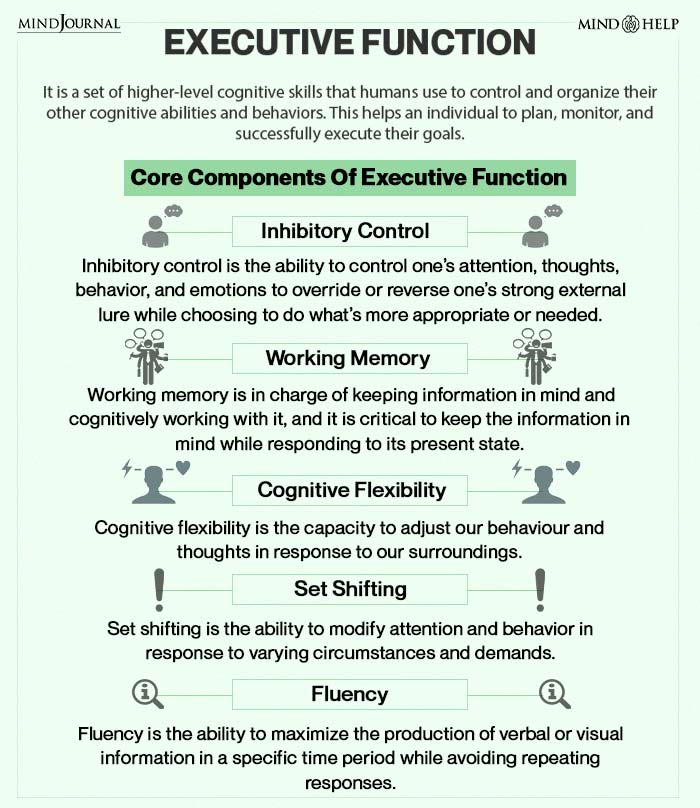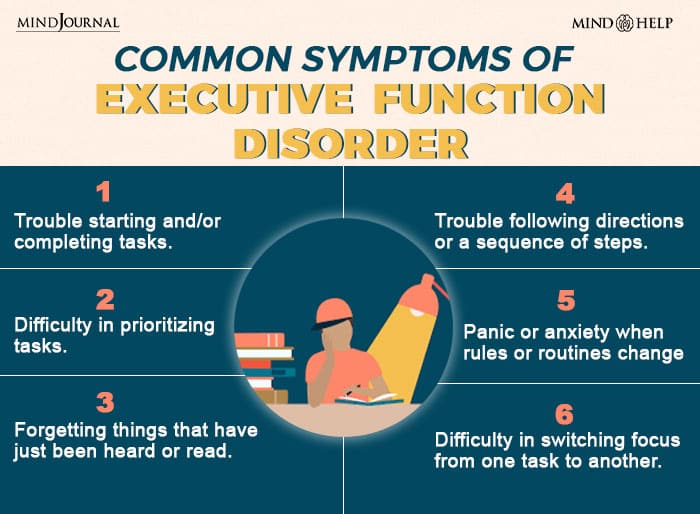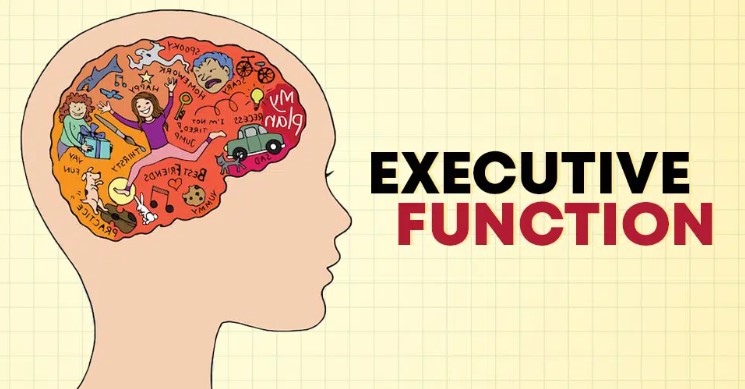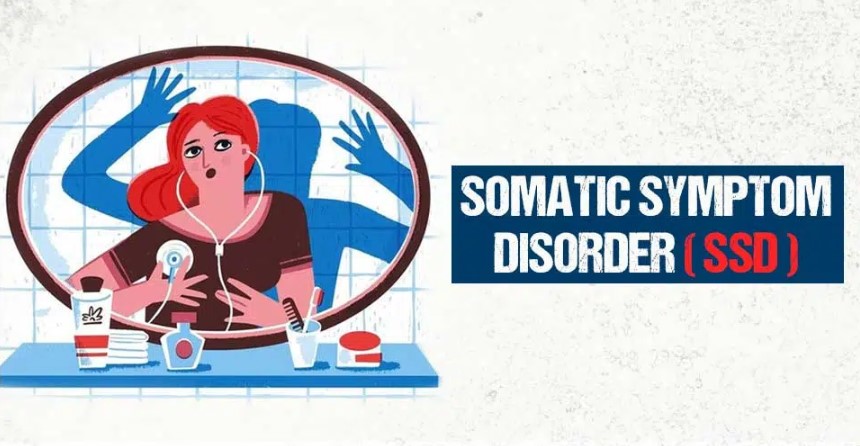Executive function refers to a set of mental skills, such as flexible thinking, working memory and self-control that are used regularly to live, learn and work. However, it can create challenges in following instructions, regulating feelings, focusing on a task etc.
What Is Executive Function?
It is a set of higher-level cognitive skills that humans use to control and organize their other cognitive abilities and behaviors. This helps an individual to plan, monitor, and successfully execute their goals. Executive function consists of attentional control, working memory, inhibition, and problem-solving, many of which are thought to originate in the brain’s prefrontal cortex. The Mind Help says, ”executive function is a collection of mental skills consisting of working memory, flexible thinking, and self-control”.
In other words, it is an umbrella term used to define management, regulation, and control of cognitive processes, including working memory, reasoning, social inhibition, problem-solving, planning, and execution. It is a theoretical cognitive system that controls the processes of executive function. This system is believed to rely on the prefrontal areas of the frontal lobe. However, while these areas are necessary for executive function, they are not entirely sufficient. We use these skills every day to learn, work, and manage daily life. Any trouble or difficulty with executive function can make it hard to focus, follow directions, and handle emotions, among other things.
A 2017 study [mfn] Diamond A. (2013). Executive functions. Annual review of psychology, 64, 135–168. https://doi.org/10.1146/annurev-psych-113011-143750 [/mfn] states that executive functions (EFs) make it possible to rationally play with ideas, taking time before any action, meeting novel, unanticipated challenges, resisting temptations, or even staying focused. Using EFs requires effort as it is easier for a person to do what he/she has been doing rather than making any changes, it is easier to give in to temptation than to resist it, and it is easier to go on “automatic pilot” than to consider what to do next.
Additionally, there are three core EFs- inhibition and interference control, working memory (WM), and cognitive flexibility. From these, higher-order EFs are built such as reasoning, problem-solving, and planning. ”EFs are skills required for mental and physical health, success in school and in life; and cognitive, social, and psychological development” says the study.
Read More About Brain Science Here.
Understanding Executive Function
A 2014 study explains that the core cognitive functions of EFs are necessary for goal-directed behavior. Additionally, the study also states that frontal cortical damage is sufficient to result in executive dysfunction but not necessary in causing it. There are a number of standardized psychological tests to assess any executive function disorder. Recovery and rehabilitation after frontal lobe injuries are often incomplete and may lead to persistent impairment in personal, social, and occupational functioning.
There are many human behaviors, such as breathing or moving away from an oncoming car, occur spontaneously while others rely on executive function. Any process or goal pursuit action defined by time management, decision-making, and storing information in one’s memory takes the help of the executive function to some degree.
Given the fact that a lot of modern life is process-driven backed by demands that individuals set and meet goals, disruptions in this function can make it difficult for someone to succeed in school, at work, or in the household. The executive system controls novel situations outside the domain of the routine, automatic psychological processes. There are five types of situations where everyday behavior is lacking optimal performance, thus highlighting the role of the executive system. These are:
- Planning or decision making
- Error correction or troubleshooting
- Novel situations with unrehearsed reactions
- Dangerous or technically difficult situations
- Overcoming a strong habitual response
- Resisting temptation
A prepotent response is defined as a response for which immediate support (positive or negative) is available. Executive functions get provoked when it is necessary to reverse prepotent responses that would otherwise occur automatically. For example, the temptation to eat chocolate cake even after being on a specific weight loss diet is where the work of executive function comes in. According to a 2009 study, executive functions are complex and can influence one’s social, emotional, intellectual, and organizational aspects. Life can get impaired when the functions get disrupted and unfortunately, such disturbances transpire in many human disorders.
Read More About Decision-Making Here
Core Components Of Executive Function

According to a 2014 study [mfn] Diamond, A. (2014). (PDF) Understanding executive functions: What helps or hinders them and how executive functions and language development mutually support one another. ResearchGate. https://www.researchgate.net/publication/267509815_Understanding_executive_functions_What_helps_or_hinders_them_and_how_executive_functions_and_language_development_mutually_support_one_another [/mfn] , there are three core executive functions (EFs) which are described below:
1. Inhibitory Control
Inhibitory control (or inhibition) is defined as the ability to control one’s attention, thoughts, behavior, and emotions to override or reverse one’s strong external lure while choosing to do what’s more appropriate or needed. ”Self-control is the feature of inhibitory control that includes resisting temptations and not acting impulsively” says the study.
The resisted temptation may include indulging in pleasures when one should not for his/her own good. Alternatively, the temptation might be to impulsively react to a situation or to perform in a way to hurt someone’s feelings or to threaten the social norms. Self-regulation overlaps to a large extent with inhibitory control but not completely.
Inhibitory control at the level of attention (selective attention) consists of staying focused on what you intend to concentrate on despite distractions (including distracting thoughts or distractions in the environment). Another aspect of inhibitory control is continuing with the task, despite distractions, and completing the task despite temptations to give up or to move on to a more interesting job.
This is related to the final aspect of self-control, making someone sacrifice immediate pleasure for a greater reward later. Without inhibitory control, we would be controlled by our impulses, old habits of thought or action, and stimuli in the environment that pull us this way or that. Thus, inhibitory control enables us to change and choose reactions and behavior rather than being unthinking creatures of habit.
2. Working Memory
Working memory (WM) is responsible to hold information in mind and mentally work with it. Changing directions into action plans requires WM, along with updating one’s thinking or planning, mentally re-ordering a to-do list, examining alternatives, or relating one piece of information to another. WM is important for making sense of anything that explains over time.
It is essential to hold the information in mind while relating to its current condition. WM is also critical for understanding what one is reading because even at a certain degree of a sentence, it is unusual to see all the words at once. Thus, humans use working memory to compare what they have read earlier to what they are reading now. Additionally, the reasoning would not have been possible without this. Thus, it is significant for:
- Helping us see the connections between apparently unrelated things and to pull apart elements from an integrated whole
- Enabling us to produce conceptual knowledge apart from perceptual input, in order to bear our decisions and to consider our remembered past while making plans for the future
3. Cognitive Flexibility
Cognitive flexibility (the third core EF) grows on the other two and develops much later. One feature of cognitive flexibility is the ability to change viewpoints, either spatially or interpersonally. To change perspectives, we need to restrain (or de-activate) our previous outlook while developing a new perspective. For this reason, cognitive flexibility requires and builds on inhibitory control and WM.
Another aspect of cognitive flexibility involves changing how we think about something. It also involves being able to adjust to changing demands or priorities, taking advantage of sudden, unexpected opportunities, overcoming sudden, unexpected problems, or even admitting the fact that one was wrong when he/she got the new information.
4. Set Shifting
Set shifting indicates the ability to modify attention and behavior in response to varying circumstances and demands. Set shifting naturally relies on working memory and response inhibition, thus, demonstrating the interdependence of different components of executive function. Patients with deficits in set-shifting may describe difficulties with multitasking and appear rigid in their thinking.
5. Fluency
Fluency represents the ability to maximize the production of verbal or visual information in a specific time period while avoiding repeating responses. The three most common types of fluency tasks are category, letter, and design. For category, fluency subjects are asked to generate as many words as possible from a specified category.
For a letter, fluency subjects are asked to generate as many words as possible that start with a specified letter, excluding names of people, places or grammatical variants of previous responses. For design fluency, subjects are asked to generate as many designs as possible while applying a fixed set of rules. Clinically deficits on these measures may correlate with “tip-of-the-tongue” word retrieval deficits, lack of initiation or inertia, or disorganization.
Symptoms Of Executive Function Disorder

Executive function disorder can affect people in different ways and the difficulties often look like the signs of ADHD as it is a problem of this condition.
A 2020 study [mfn] Krieger, V., Amador-Campos, J. A., & Guàrdia-Olmos, J. (2020). Executive functions, Personality traits and ADHD symptoms in adolescents: A mediation analysis. PloS one, 15(5), e0232470. https://doi.org/10.1371/journal.pone.0232470 [/mfn] states that attention deficit hyperactivity disorder (ADHD) is a condition that starts in the childhood years. The condition is identified by a resolute pattern of distracted and hyperactive/impulsive behaviors, leading to three presentations: inattentive (ADHD-IA), hyperactive/impulsive (ADHD-HI), and combined (ADHD-C).
The study states that ADHD symptoms indicate multiple causal pathways. However, individuals showing differences in executive functions (EF), temperament, and personality traits may have an association with the emergence, variation, or persistence of ADHD symptoms. EF has been defined as “a group of cognitive control processes that influence lower-level processes to regulate and shape behavior”.
The study goes on to say that executive control requires flexible top-down or controlled information processing from the prefrontal executive areas. “EF depends on the modulation of attention and emotion across bottom-up or automatic non-executive processes from limbic subcortical regions (e.g., amygdala)” says the above mentioned research. Thus, in a broader sense, top-down processes modulate, suppress, or bias bottom-up information via EF.
In children and adolescents with ADHD, a study [mfn] Graziano PA, McNamara JP, Geffken GR, Reid AM. Differentiating co-occurring behavior problems in children with ADHD: patterns of emotional reactivity and executive functioning. J Atten Disord. 2013 Apr;17(3):249-60. doi: 10.1177/1087054711428741. Epub 2011 Dec 29. PMID: 22210802. [/mfn] has shown connections between top-down and bottom-up processes and ADHD symptoms. In ADHD groups, EF has been traditionally assessed with highly regulated and structured assignments that assess some top-down modulation, but not the effective or motivational component. Thus, a growing body of research shows that children and adolescents with ADHD are more likely to experience a level of damage in at least some performance-based measures of core EF skills than their peers.
The common symptoms of executive function disorder include:
- Trouble starting and/or completing tasks
- Difficulty in prioritizing tasks
- Forgetting things that have just been heard or read
- Trouble following directions or a sequence of steps
- Panic or anxiety when rules or routines change
- Difficulty in switching focus from one task to another
- Getting overly emotional and fixate on things
- Facing challenges while organizing the thoughts
- Having trouble keeping a track of their belongings
- Difficulty in managing time
Read More About Time Management Here
Causes Of Executive Function Disorder
Executive dysfunction/ disorder is a term that refers to difficulties pertaining to a range of cognitive, emotional, and behavioural aspects, which often occur after trauma to the frontal lobes of the brain. Disorders of executive functions are obvious after acquired brain injury and leave a severe effect on many aspects of everyday life. However, the exact cause of poor executive functioning is still unclear.
Like other developmental challenges such as ADHD, the cause is assumed to be a combination of genetics, early childhood trauma, prenatal exposure to drugs or alcohol, or other factors. Again, there are times when there is no obvious cause. However, a study states that a lot of research has been conducted to understand what causes trouble with executive function and ADHD. The study came up with two factors which are as follows.
1. Variations In Brain Development
After the examinations by the researchers of the study found out that certain areas of the brain tend to develop slowly in people who struggle with executive skills. These areas are responsible for working memory and emotional control.
2. Genes And Heredity
People who have difficulty with executive function often have family members with the same condition. Additionally, the trouble with executive function may also occur with learning challenges. Learning disabilities do not always include problems with executive function, however, it’s not uncommon for kids with this condition to have troubles with executive skills. A 2015 study [mfn] Rabinovici, G. D., Stephens, M. L., & Possin, K. L. (2015). Executive dysfunction. Continuum (Minneapolis, Minn.), 21(3 Behavioral Neurology and Neuropsychiatry), 646–659. https://doi.org/10.1212/01.CON.0000466658.05156.54 [/mfn] states that the concept first appeared from deficiencies observed in patients with injuries in the frontal lobe. With the establishment of functional neuroimaging, it became clear that executive functioning relies on distributed neural networks that include the prefrontal cortex along with the parietal cortex, basal ganglia, thalamus, and cerebellum.
‘Overlapping activations in these regions are seen in paradigms that engage working memory, set-shifting, response inhibition, fluency, and planning” states the study. Thus, executive dysfunction arises from any neurologic process that encompasses these regions, their white matter connections, or neurotransmitter systems.
Diagnosis Of Executive Function Deficit
The initial evaluation of executive functioning after a brain lesion is generally carried out by a clinical neuropsychologist. The assessment provides complete information about an individual’s cognitive, emotional, and behavioral deficits. The results can then assist in planning rehabilitation or treatment strategies to manage the problems. During an assessment, the neuropsychologist will consider the following questions:
- What are the main problems being faced by the individual and his/her family?
- How are the problems affecting functioning in everyday life?
- What are the goals of the person and can he/she go back to work/college/school?
- To what degree are the executive deficits associated with other problems in areas such as language, memory, and perception?
- How do the person’s abilities compare with others of the same age, background, gender, and injury to a similar area of the brain?
- How is the person with brain injury and their family coping?
- What kind of treatment should be offered?
Neuropsychological assessments include an array of several standardized tests, designed to measure different aspects of cognitive functioning. Some of these tests are in a questionnaire, puzzle, or in-game format, others take place in a real-world environment. It is essential that the tests are performed without any prior knowledge or preparation in order to accurately understand an individual’s abilities. It provides an indication of the areas that need help and improvement.
Treatment Of Executive Function Disorder
Treatment of executive function disorder can be challenging for the doctors and requires an individualized approach. The treatment program for each patient depends on various factors, like –
- Their goals & objectives
- The nature of their difficulties
- Self-awareness
- Readiness to engage in the treatment
- Level of social support
- Presence of other issues, such as mood disorders
An important part of the treatment program includes educating the person about the consequences of the injury. This can help increase the person’s insight and understanding of what has happened to him/her. It must be noted that while some treatments may help slow the condition, the symptoms may continue to get worse over time. However, most of the issues catering to executive function disorder are highly treatable. Here are the treatment options for EF disorder.
1. Therapy
Therapy is one of the most common forms of treating executive function disorder and of all the therapies, occupational therapy is one treatment option to consider. In such cases, the therapist may suggest breaking tasks into smaller pieces. He/she may suggest writing notecards to counterbalance for memory deficits while making lists of tasks to complete and checking off the ones upon completion.
2. Cognitive-behavioral therapy (CBT)
Another treatment option to approach executive function disorder (EFD) is cognitive-behavioral therapy (CBT [mfn] Mohlman J, Gorman JM. The role of executive functioning in CBT: a pilot study with anxious older adults. Behav Res Ther. 2005 Apr;43(4):447-65. doi: 10.1016/j.brat.2004.03.007. PMID: 15701356. [/mfn]. It is often used in combination with medication to treat conditions such as ADHD (attention deficit hyperactivity disorder) This method tends to be more prosperous with older children and adolescents, as younger children struggle to alter their behavior too drastically.
Read More About Cognitive Behavioral Therapy Here.
3. Medication
Traditional medications used for the treatment of EFD include stimulants, antidepressants, and antipsychotic medications. While some medications may help slow the disease, over time symptoms will likely continue to get worse.
4. Behavior Modification
A reward system is sometimes applied to keep children with EFD on track. For example, the teacher can make a chart and place a sticker on each day a child hands in homework. After five stickers, the child gets a prize. Another option would be sending daily reports home. The parents can then decide on a reward at home after a series of good reports.
5. Accommodations
In a school setting, a psychologist can recommend a number of accommodations. Accommodations can include things like giving extra time for test-taking, homework assignments, and projects along with special seating in the classroom.
A 2015 study states that treatment of executive function disorder needs to be tailored exclusively for every individual patient. The first step is to recognize and treat the primary underlying condition. For example, performance on executive function tests responds to cholinesterase inhibitors in Alzheimer’s disease whereas patients with Parkinson’s disease perform better on dopamine replacement therapy.
An evaluation via occupational therapy can help explain the ”real-world functional implications” in order to ensure patient safety and maximize function. Cognitive rehabilitation strategies include compensatory techniques, environmental manipulation, and direct interventions. Experimental approaches include dopamine agonist therapy in patients without known dopamine deficiency, computer-based brain exercises, and transcranial magnetic stimulation.
Coping Strategies For Executive Function Disorder
Given the fact that executive function shapes up a major part of our everyday lives, it is essential to find coping techniques of survival strategies when problems arise. Here are a few suggestions of coping strategies that may help one if he/she is facing difficulties.
1. Planning
Individuals or patients must give themselves plenty of time to plan activities while recording the plans via aids such as calendars, diaries, electronic timing devices, mobile phones, etc. Here’s how one can go about the entire planning process.
- While planning a day, week, or a specific activity, individuals must use a step-by-step approach, breaking down the activity into manageable ‘chunks’.
- It is better to use checklists and ticking off each part of the activity upon completion. This will also help the patient to stay on track.
- Individuals must mentally practice their plans.
- Individuals should also discuss their plans for a particular day with others.
- The step-by-step checklists can be placed in important spots in the house in order to remind one of the various sequences to go through that are involved in a task.
- Also, one can develop a weekly routine for tasks like shopping, washing, and tidying the house.
- Additionally, one must have a backup plan ready beforehand before any sort of problem arises.
2. Mood
If an individual is facing difficulties managing his/her emotions, he/she can follow the tips given below.
- If the patient is unable to manage his/her emotions, he/she may seek professional help to talk to the doctor. The doctor may refer the person to a therapist who will work for the person, such as developing cognitive-behavioral therapy (CBT) strategies.
- It may be helpful for the person to take help from others when he/she faces any difficulty in controlling the mood. When the person feels very upset, someone close to the person can calm him/her in the short term and discuss it with the person later.
- Others may need to make adjustments for changes in the person’s behavior and personality. It is important for others to remember that the changes are a result of the injury and not because the person is acting lazy, self-centered, or difficult.
3. Social Difficulties
Here’s how one can take help from close ones with the difficulties arising due to EFD.
- Trusted friends or family members could help the person by reminding him/her of what may be the most appropriate thing to do or say if he/she is struggling in social conditions.
- The person can mentally prepare for social situations by thinking about any difficult circumstances that have occurred before in similar environments.
Suggestions For Caregivers
Taking care of the person with executive deficits is like performing a full-time job and living with personality and behavior changes in your close one can be very distressing. Problems that you, as a caregiver, may face are:
- Stress, anxiety, or depression
- Restricted leisure/social life
- Strained relationships
- Increased responsibility
- Feeling tired and frustrated
- Reduced communication with partner
- Reduced sexual and emotional intimacy with a partner
Thus, it is essential for the family members, caregivers, and friends to seek support for their practical and emotional needs. They can join therapy groups and share their story with people who are facing the same problem. This will make the caregivers feel less lonely in the journey. Additionally, they also hire professionals to take care of the patient so that they can take some time off to indulge in their hobbies or take care of themselves.
Seek Immediate Help
Executive function is critical for adaptive behavior and everyday activities in one’s life. They are a diverse, related, an overlapping set of skills. The functions rely on widespread frontal, parietal, and subcortical brain networks. Any deficit in this area can occur as the result of a variety of neurologic conditions including traumatic brain injury, neurodegenerative diseases as well as a number of psychiatric and developmental disorders. Thus, knowledge of the components of executive functions, its underlying neuroanatomy, and differential diagnosis can help guide the doctor toward an accurate diagnosis and optimal treatment plan.
Executive Function At A Glance
- Executive function is a collection of mental skills consisting of working memory, flexible thinking, and self-control.
- Impairment of executive function can affect people in different ways and the difficulties often look like the signs of ADHD as it is a problem of this condition.
- Impairment of executive functions is obvious after acquired brain injury and leaves a severe effect on many aspects of everyday life.
- The initial evaluation of executive functioning after a brain lesion is generally carried out by a clinical neuropsychologist.
- Executive function is critical for adaptive behavior and everyday activities in one’s life.










Leave a Reply